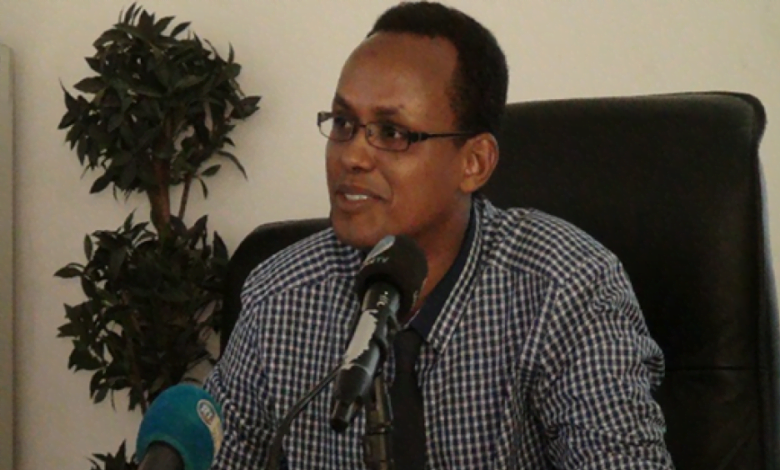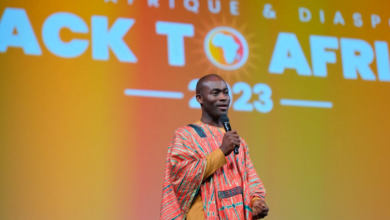Aden Omar Abdillahi : “Djibouti is talking to the whole world”
Djibouti has managed to raise its international profile by capitalizing on its strategic location. How has this small state managed to make the most of the global game? Aden Omar Abdillahi, director of the Institute for Political and Strategic Studies at CERD (Djibouti Centre for Studies and Research) and co-editor of Djibouti in the XXIème siècle (Karthala, 2023), provides the answers.

By Stephanie Hartmann
Djibouti is a small country that hosts the military bases of several major powers. How do you explain this attraction?
Djibouti’s international appeal can be explained by its geography and history. Firstly, Djibouti is located at the southern entrance to the Bab el-Mandeb Strait, not far from the Arabian Peninsula, where there are major oil reserves. This route connects the strait to the Gulf of Aden and the Indian Ocean, through which some of the world’s goods pass, a quarter of which are hydrocarbons. Djibouti is also a stable country in an unstable region. It has a well-developed and diversified port infrastructure. This vocation has been dictated by history. Under colonial rule, the French built the port to export salt and marine resources such as mother-of-pearl, oysters and fish. Djibouti became an important port for colonial France as it provided a link between the East African economy and the French Asian economy, Indochina.
The port had historical significance, but now it has geopolitical significance?
Djibouti gained geopolitical importance after September 11, 2001. After the attacks, the Americans negotiated and received permission to set up a military base. They chose Djibouti because of the French presence, but above all because of its proximity to the Arabian Gulf. From Djibouti, the United States can monitor the peninsula, Yemen and Somalia, where Al-Qaeda still has camps. Since 2008, the issue of maritime piracy off the coast of Somalia has also given Djibouti a new geopolitical dimension. This has led to the hosting of new military missions: EUNAVFOR (the European naval force) leading Operation Atalanta, and a Japanese military base. Later, in 2017, a prestigious Chinese military base was inaugurated. But this base is being built outside the context of piracy and terrorism.
Does this mean that the security issue is not what motivated China? You’re talking about a prestige base…
The Chinese base was built against the backdrop of the Arab Spring. These were events during which China was unable to evacuate its nationals, especially after the fall of Gaddafi in Libya in 2011. This was seen as a humiliation. In addition to these events, the Middle Kingdom wants to say to the world: “We are a power”. After all, the People’s Republic has invested heavily in the region, in Kenya, Ethiopia and the whole of East Africa. Many of its citizens live there, as well as in the Maghreb and the Arabian Peninsula. China has decided to establish itself in the region, and for a long time to come. What began as a military facility focused on training has become – and China acknowledges this – a real military base.
How much do all these military installations generate for Djibouti? Can we talk about security revenues?
There was a time when the French military presence accounted for more than half of Djibouti’s GDP. Today, the French military presence has been reduced. There are now only 1,400 soldiers, compared with nearly 5,000 at the height of their presence. With the reduction in numbers, and despite the establishment of new bases, it is estimated that the rents received today represent less than ten percent of GDP. The rents – as some call them – are not adequate. The countries concerned benefit from numerous tax and duty exemptions. According to some estimates, a single military base could generate between 200 and 300 million dollars a year. At present, the French base brings in only €30 million a year and the American base $63 million. But the Djibouti government is not interested in making its bases profitable. Above all, these bases give it global visibility and prestige. Moreover, this presence indirectly ensures Djibouti’s security and strengthens its defense apparatus. The financial loss is offset by other benefits.
Can it be said that Djibouti, unlike other former French colonies, is not part of the Western axis?
Djibouti looks after its own interests first and foremost. We are not part of the Western bloc, the Asian bloc or the Chinese bloc. But relations with China are part of a win-win model. In return for the military base, the Chinese invest in the country. This is not the case for Europeans and Westerners in general. The Western partners can obtain facilities for Djibouti from the IMF (International Monetary Fund) and the World Bank, but these are not investments. China, on the other hand, is present, as are its companies, sometimes at the cost of debts that are difficult to bear, but these are commercial investments that can be easily repaid by the companies in which they are made. Sometimes this may seem reckless, but the Djibouti government believes that you have to take risks to get ahead.
You say that Djibouti is defending its interests, but doesn’t China’s strong presence create a risk of dependency?
Let’s not be naive. Djibouti relies heavily on Chinese investment. But as long as there is a Chinese military base, there will always be room for negotiation. We’re a strategic partner, as our relations show, and we’re not going to get bogged down in loans that are not repaid on time. Even if China isn’t the only one, Djibouti doesn’t have just one partner. We have to distinguish between private companies and state-owned companies. We shouldn’t mix everything up. But hosting a military base gives us more leverage in negotiations.
What are Djibouti’s relations with Russia? Is this a red line that the US doesn’t want Djibouti to cross?
The Djibouti authorities are talking to everybody. There was a time, under President Barack Obama, when the United States urged the Djibouti government not to accept a Russian base. But things have moved on. That doesn’t mean that the relationship between Djibouti and Russia has strengthened. There are talks. And there are no problems between Djibouti and Russia. Some Djibouti government officials think there are too many bases. Some people say: “Enough is enough, we won’t be able to manage the rivalries and animosities between all these people,” but nothing is ruled out. Everything will depend on our interests, on global and regional developments, but also on our links with our Western partners.
Djibouti’s international stature does not mean that it is any less present at regional level. What about Ethiopia? If Ethiopia goes bad, does Djibouti go bad too?
Absolutely yes. As we saw during COVID and also during the Tigray war, our two economies have reached a point of interdependence that makes it difficult to imagine Djibouti’s development without a healthy Ethiopian economy. But today I think Ethiopia needs Djibouti more than Djibouti needs Ethiopia. That is why Addis Ababa is actively on the lookout for alternatives. At the same time, Djibouti is also trying to diversify its activities and its customers away from the port and trade with Ethiopia. While Ethiopia has every right to look to neighboring countries to transport its goods, Djibouti also needs to diversify its customer base and its economy so that it is no longer dependent on port activities. But that is not for tomorrow. We are still condemned to cooperate. Some Ethiopian officials are losing patience, but that’s just talk. The reality is very different.

The IEPS, a tool for reflection and analysis
Founded in December 2008 in the wake of the war between Djibouti and Eritrea, the Institute of Political and Strategic Studies (IEPS) of the Djibouti Center for Studies and Research (CERD) aims to provide independent analysis of contemporary political and geopolitical issues. The IEPS works to improve understanding of Djibouti’s governance, economy and society, and to deepen knowledge of the Horn of Africa and the geopolitical issues affecting Djibouti. It is also an open forum for debate and the generation of new ideas.





